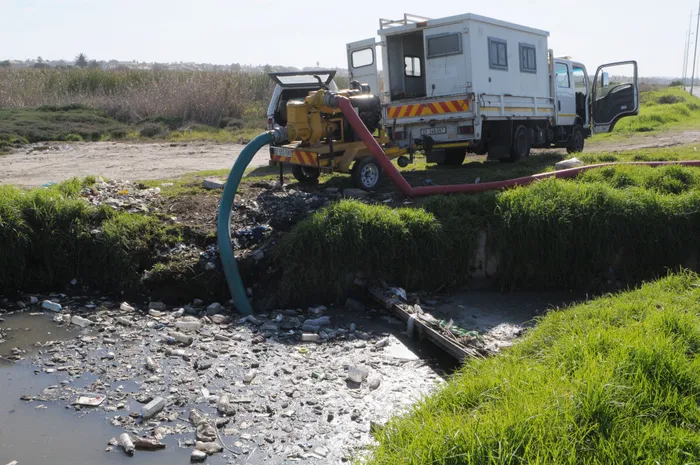City, researchers at loggerheads over ‘chronic pollution’

Workers pumped sewage out of Milnerton lagoon with the use of a generator.
Image: File
THE City has doubled down in the face of damning new evidence, a peer-reviewed study led by UCT researchers which accuses the municipality of repeatedly denying, interfering with, and distorting science to cover up chronic pollution in the city’s rivers, wetlands, and coastal waters.
Based on over a decade of multidisciplinary research, the study reveals how City officials have repeatedly “ignored or undermined” independent scientific findings pointing to serious public health risks. Despite mounting evidence of raw and poorly treated sewage flowing into Cape Town’s rivers, wetlands and coastal waters, the City has continued to deflect criticism and downplay the scale of the crisis.
“Our goal has been to bring evidence of contaminants to the attention of officials responsible for a clean environment,” said the study’s lead author from UCT, Professor Lesley Green, director of Environmental Humanities South.
According to researchers, Cape Town discharges more than 40 megalitres of raw sewage into the Atlantic Ocean daily.
“In addition, run-off from informal settlements and poorly functioning wastewater plants contribute to pollution in the Indian Ocean and inland water systems. This contamination carries significant risks for human health, ecosystems and the economy.”
The researchers say despite efforts to engage with authorities and the public through scientific publications, a dedicated website, public outreach and a documentary, they have faced sustained pushback. This, they say, includes public denouncements and online harassment. In one instance, a political party demanded an apology for laboratory findings.
To understand how science was sidelined, the researchers analysed 11 years’ worth of media statements, City reports, and political commentary.
Drawing on international research into strategies that deflect evidence of harm, they identified 18 distinct forms of science miscommunication in Cape Town.
These included the non-disclosure of test results, selectively or misleadingly interpreting findings, using City-commissioned studies to support political narratives, and presenting single water samples as representative of long-term conditions, despite the known variability of river and ocean systems.
“Instead of engaging with evidence, City officials have appropriated the authority of science for brand and political reputation management. Science is only authoritative to the extent that it is open to counter-evidence,” Green explained.
The City’s wastewater treatment approach still relies on century-old models that discharge raw or poorly treated sewage into rivers, wetlands and oceans, said Green.
“Both the volume of waste from a large city, and new chemical compounds that do not break down in the open environment, makes that approach unworkable. This is a global problem and it needs all hands on deck to address it.”
The City said they were reviewing the study and would respond via “academic channels” adding that the allegations were far from the truth.
“In general, Cape Town is widely recognised as South Africa’s leading city for transparency on coastal water quality data. The City conducts South Africa’s most robust coastal water quality monitoring programme with over 100 locations that are sampled: 45 of these weekly, 44 bi-monthly, 15 monthly, and in some instances daily (e.g. Camps Bay and Strand). Unlike other cities, all data is published online for the public and academics to study and draw their own conclusions.
“The data is produced by independent experts and independent laboratories, and is not open to manipulation by the City. At any time, members of the public can go online and check which parts of our coastline have pollution challenges and what the water quality results are like for their favourite beach. Cape Town is also investing far more than any city to upgrade our wastewater treatment infrastructure.
"It’s unfortunate that the study seemed to not recognise Cape Town’s standout transparency efforts. The City has always been very clear and transparent about the challenges we are facing regarding urban pollution, the interventions needed, and the allocation of resources in finding long-term solutions. Thus, the allegations and assertions in the release cannot be further from the truth. Regarding outfalls in particular, the City has published 10 years of extensive monitoring, reporting, and analyses from independent experts, all available online including data from hundreds of water samples from around 18 stations at each marine outfall."
"We sample and measure hundreds of environmental factors including chemical, pharmaceutical, nutrient and metal contaminants at the three outfalls as well as at two False Bay sites every single month in accordance with a monitoring programme approved by the National Department of Forestry, Fisheries and the Environment. This important work is done by an appointed external team of marine science experts, who present the results quarterly to the City’s Permit Advisory Forum, which is open to the public.”
Cape Times